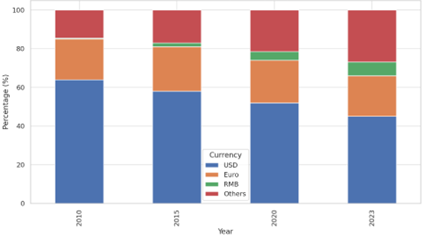Shifting Global Economic Orders: The Rise of BRICS+ and the Decline of Dollar Hegemony
Keywords:
BRICS+, De-Dollarization, Global Economic Order, Multipolar Financial SystemAbstract
This study explores the evolving dynamics of the global economic order by examining the rise of BRICS+—an expanded coalition of emerging economies including Brazil, Russia, India, China, South Africa, and recent entrants—and its challenge to the long-standing dominance of the U.S. dollar in international finance. Through a mixed-methods approach combining quantitative data analysis and qualitative review of institutional developments, this research investigates how BRICS+ nations are pursuing de-dollarization strategies, creating alternative financial institutions, and fostering trade in local currencies. The study reveals a steady decline in the dollar’s share of global reserves and transactions, alongside a growing reliance on the Chinese yuan, gold reserves, and intra-BRICS+ currency swaps. These findings suggest that the global financial system is transitioning from a unipolar dollar-centric model toward a more multipolar framework. While the dollar retains significant advantages in terms of liquidity and institutional trust, the trajectory of BRICS+ economic cooperation indicates a major geopolitical shift with long-term implications for global governance, monetary sovereignty, and economic security.








